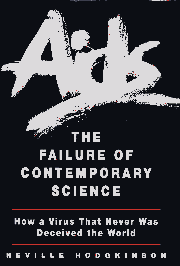 |
|
 |
|
| “There’s a wider issue. We’ve been led to believe the scientific method, in a pure sense, is the best way of getting information. I believed in that in a fairly simplistic way myself for many decades. But this particular issue shows how inner agendas, unacknowledged agendas, of scientists as human beings, interfere with their ability to assess the facts in an objective way. It’s a sort of mass pathology. That’s the conclusion I’ve come to now. It’s a very interesting issue. The way the scientific community has treated these dissidents within their ranks really has been quite extraordinary. I hadn’t realised that they could behave in such a sort of narrow way. I hadn’t seen it at first hand in this way. I’d heard stories, you know. But people that I know well, and have a lot of respect for, have been extruded from communicating with the mainstream. It’s been remarkable. In fact at one time Nature magazine, which is a sort of Bible of science, announced a campaign to try to stop me from reporting on these lines in the Sunday Times. They ran an editorial contemplating sending pickets to our offices, decided that was impractical, and decided instead to create a sort of campaign of ridicule. It created quite a stink, actually. This book was vetted by a top virologist in this country and I received training from virologists in basic molecular biology. I wouldn’t have been able to carry the critique without that. They might well find some holes in what I’m saying. That’s OK. But I hope there’ll be something there for them to find of interest and challenge. The only things that I’ve found frustrating have been when people just blast you with statements. Some TV or radio programmes have been like this, where one says something and they just say, ‘well, that’s rubbish, because x, y, and z’. And you know all the assertions they’re making are wrong. When that happens, and in the context of TV and radio, there’s no opportunity for dialogue. What I would hope would be that this would be an opportunity for dialogue, rather than people just stating contrary opinions. I don’t mind a person expressing that view, and saying why, providing one has an opportunity to say something in response. But in these TV and radio things, especially ten-minute interviews, if they have other people there for so-called balance, it means you just don’t get anything across at all. I did do the Target programme; that was good. That was a half-hour programme. They have someone who’s a target, you know. I don’t mind that, because there was an opportunity to reply. I’ve been studying this for about four years now, almost full-time. It’s the only way to do it. I couldn’t hope to persuade anyone! All I could do is give some pointers to those who were interested that there was more to it than they’d been allowed to understand from what most media had reported. A gentle title—AIDS, an alternative view, something like that. A controversial point of view, something like that. Neville Hodgkinson, former medical and science correspondent on the Sunday Times. Author of the book, AIDS—the Failure of Contemporary Science. You could say that I’m going to tell my experiences in reporting on this very, er, emotional? Controversial? Emotive. Subject, from a controversial point of view. Something like that. Reporting on a challenge to mainstream scientific opinion. Challenges to mainstream scientific opinion. Mention that Nature one time tried to silence me. .. All right, fine..” |